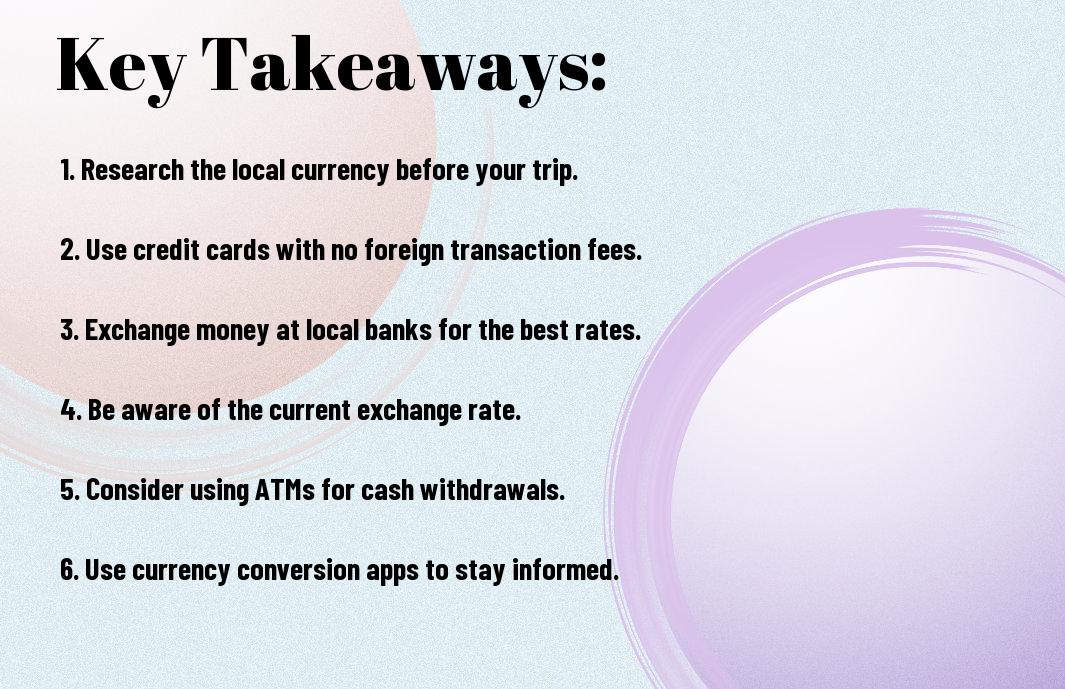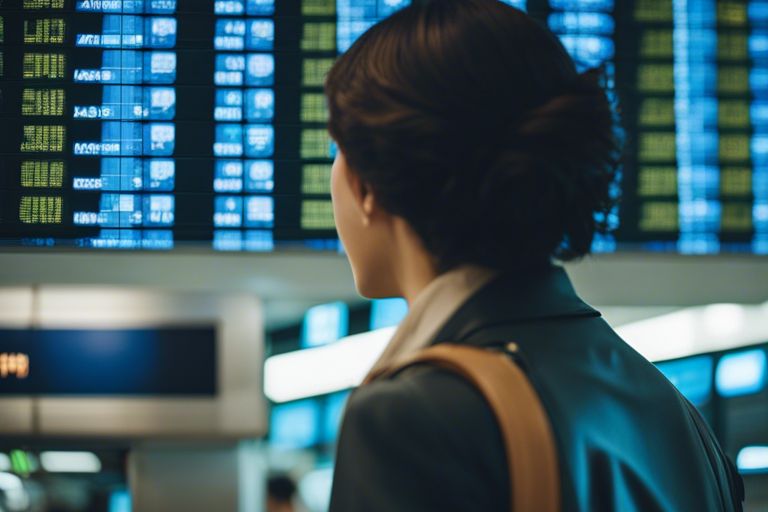Table of Contents
Are you planning a trip abroad and feeling overwhelmed by the prospect of dealing with foreign currency and exchange rates? Fear not, for we have got you covered. Navigating foreign currency and exchange rates can be daunting, but with the right knowledge and preparation, you can ensure a smooth and cost-effective experience. Understanding exchange rates and knowing where to exchange your money can save you from unnecessary headaches and financial losses. On the positive side, having a good grasp of these concepts can also help you maximize your budget and make the most of your travel experience. In this blog post, we’ll walk you through everything you need to know about managing foreign currency and exchange rates while traveling.
Key Takeaways:
- Research exchange rates: Before traveling, take time to research the exchange rates for the currency of the destination country to get an understanding of the current value of your home currency.
- Compare exchange options: Explore different options for exchanging currency such as banks, ATMs, currency exchange offices, and credit card usage to find the best rates and lowest fees.
- Avoid airport exchange booths: Exchange rates at airport booths are often unfavorable, so it’s best to avoid them if possible and exchange currency elsewhere.
- Notify your bank: Inform your bank of your travel plans to avoid having your card blocked for suspicious activity when making purchases abroad or withdrawing cash in a foreign country.
- Be mindful of additional fees: When using credit cards or withdrawing cash from ATMs abroad, be aware of any foreign transaction fees and ATM fees that may apply to your transactions.

Preparing for Your Trip
One of the most important aspects of traveling abroad is ensuring that you are prepared to handle foreign currency and exchange rates. Properly preparing for your trip can help you avoid unnecessary fees and ensure that you have access to the local currency when you arrive at your destination.
Researching Exchange Rates
Before you depart for your trip, it is essential to research the exchange rates for the currency of the country you are visiting. Knowing the current exchange rate will help you budget for your trip and understand the value of the local currency. Keep in mind that exchange rates can fluctuate, so it’s a good idea to monitor them in the weeks leading up to your departure.
Options for Exchanging Currency
When it comes to exchanging currency, there are several options available to you. Using ATMs is often the most convenient and cost-effective way to get cash in the local currency. However, be aware that some ATMs may charge high fees for international transactions. Exchanging currency at a local bank or currency exchange can also be a good option. Just be sure to compare rates and fees before making any transactions. Additionally, you can consider carrying a small amount of the local currency with you when you arrive, so you have immediate access to cash for essentials like transportation and meals.
Managing Money While Abroad
Lastly, it’s essential to know how to manage your money while you are traveling abroad. This includes understanding how to use ATMs and credit cards internationally, as well as how to get the best exchange rates for your currency.
Using ATMs and Credit Cards Internationally
When using ATMs and credit cards internationally, it’s important to be aware of the fees associated with foreign transactions. Many banks and credit card companies charge a foreign transaction fee each time you use your card abroad. Additionally, some ATMs may charge a fee for international withdrawals. Before you travel, be sure to check with your bank or credit card issuer to understand these fees and consider getting a travel-friendly credit card with no foreign transaction fees.
Tips for Getting the Best Exchange Rates
When it comes to getting the best exchange rates, it’s wise to avoid exchanging currency at airports or tourist areas as they often offer unfavorable rates. Instead, consider using your ATM card to withdraw local currency, as this typically offers a better exchange rate. Another tip is to use your credit card for larger purchases, as this can also provide a competitive exchange rate. Additionally, you can keep an eye on the exchange rate and exchange your money when the rates are favorable. Knowing the current exchange rate can help you make informed decisions about when to exchange your currency.
- Avoid exchanging currency at airports or tourist areas
- Use your ATM card for local currency withdrawals
- Use your credit card for larger purchases
- Keep an eye on the exchange rate
Knowing the ins and outs of managing your money while abroad can help you make the most of your travel experience and ensure that you are getting the best value for your money.

Avoiding Common Pitfalls
Now that you have a better understanding of foreign currency and exchange rates, let’s talk about how to avoid common pitfalls when dealing with them. It’s important to be aware of potential issues that may arise to ensure a smooth and hassle-free travel experience. To further educate yourself on this matter, you can also check out this article on the Best Ways to Exchange Money While Traveling.
Understanding Fees and Charges
When exchanging currency, be sure to familiarize yourself with any fees and charges that may be applied. It’s crucial to know the exchange rates, commission fees, and any other hidden costs that could potentially impact the amount of money you receive. Before making any transactions, inquire about the total cost and make comparisons between different exchange options to ensure you are getting the best deal.
Steering Clear of Currency Exchange Scams
Unfortunately, currency exchange scams are not uncommon for travelers. Be aware of offers that seem too good to be true and always trust reputable and authorized exchange providers. Avoid exchanging money with individuals on the street or through unverified sources. Additionally, be cautious of counterfeit currency and always double-check the authenticity of the bills you receive.

Technologies and Tools
However, with the advancement of technology, there are now various tools and resources available to help you navigate foreign currency and exchange rates more effectively.
Mobile Apps for Currency Conversion
Mobile apps for currency conversion are a convenient way to quickly check exchange rates and convert currencies on the go. These apps usually have up-to-date exchange rate information and can also work offline, which is especially useful when traveling to remote areas where internet access is limited. Some apps even offer features such as real-time alerts for favorable exchange rates, making it easier for you to make informed decisions about when to exchange your money.
Online Resources and Alerts for Exchange Rates
Online resources such as currency exchange websites and alert services can provide you with comprehensive information about exchange rates and currency trends. Subscribing to exchange rate alerts can help you stay updated on favorable rates and make timely decisions on when to exchange your currency. Additionally, you can also access historical exchange rate data and analysis to better understand the foreign exchange market and make informed decisions.
FAQ
Q: What is foreign currency and exchange rates?
A: Foreign currency refers to the currency of a country other than your own, while exchange rates are the value at which one currency can be exchanged for another. Exchange rates fluctuate based on economic factors and can have a significant impact on the purchasing power of your home currency when traveling abroad.
Q: How can I navigate foreign currency and exchange rates while traveling?
A: Before traveling, research the currency of the country you will be visiting and familiarize yourself with the current exchange rate. It’s also a good idea to carry a small amount of the local currency to cover immediate expenses upon arrival. During your trip, use reputable currency exchange services to convert your money, and be mindful of any associated fees or commissions. Additionally, consider using credit cards with low foreign transaction fees or withdrawing cash from ATMs that offer favorable exchange rates.
Q: What factors can affect exchange rates while traveling?
A: Exchange rates are influenced by a variety of factors, including interest rates, inflation, political stability, and economic performance. Major events such as elections, geopolitical tensions, or natural disasters can also impact exchange rates. It’s important to stay informed about these factors and how they may affect the value of your home currency in relation to the foreign currency you’ll be using while traveling.

